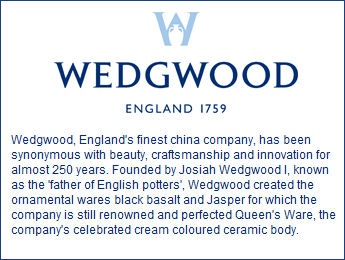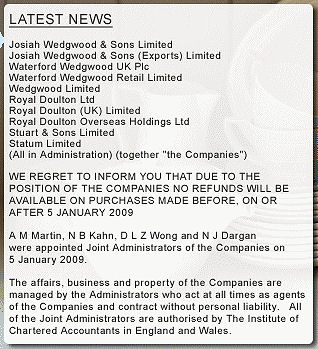
Wedgwood goes into administration
Iconic china and ceramics firm Waterford
Wedgwood has gone into administration after the economic slowdown hit the
debt-laden firm.
Deloitte has been appointed as administrator to seek buyers for different
parts of the company.
It said failed buyout talks and poor trading meant restructuring could not
happen "in an acceptable timescale".
Wedgwood has also requested that its shares be suspended from trading on
the Irish Stock Exchange. And a receiver from Deloitte has been appointed
to Wedgwood's Irish
arm.
"Waterford,
Wedgwood and Royal Doulton are quintessentially classic brands that
represent a high quality product which is steeped in history," said
joint administrator Angus Martin.
The administration team will be working closely with management,
customers and suppliers during this time to ensure operations continue
whilst a sale of the business is sought."
The company will continue to trade as a
going concern.
Manufacturing jobs
Chief executive David Sculley had earlier said he was "disappointed" some
of its UK and Irish subsidiaries had been forced into administration or
receivership.
But he was optimistic that a buyer could be found for the Waterford,
Ireland-based business, known for its Wedgwood pottery, Royal Doulton and
Waterford crystal.
In the UK, Waterford Wedgwood employs 1,900 people - of these, around 600
work in manufacturing at Barlaston, Stoke-on-Trent.
The Irish section has around 800 staff based in Waterford.
In total there are 5,800 employees outside the UK with the biggest
manufacturing centre being in Indonesia, where there are 1500 staff
involved in production.
Wedgwood has been known as an iconic name in British pottery firm for 250
years, with many households in the UK owning one or more of their pieces.
In 1987 it merged with the similarly well-known Waterford Crystal to
create Waterford Wedgwood, an Irish-based luxury brands group.
But BBC business editor Robert Peston has said it is "no surprise" that
the heavily indebted firm has floundered.
"Waterford Wedgwood's
collapse is a resonant event, that speaks of a noxious global squeeze on
consumer spending," he said.
"Almost everything that it manufactures is a nice-to-have rather than a
must-have. "And most of us are thinking twice about shelling out on
nice-to-haves."
Mr Peston said that although Waterford Wedgwood had more history than most
FTSE 100 companies combined, it was not a huge company.
"The brands will surely survive under new owners," added our business
editor.
"However what happens to its manufacturing plant - and that of many other
companies like it - is what matters.
"Even if in Waterford Wedgwood's case there are just a few hundred British
manufacturing jobs at stake, the UK can ill afford to see precious
exporting capacity relocated to low-cost, competitor economies. "
Wedgwood is one of the biggest employers in the
Stoke area, said Kevin Farrell, chief executive of the British Ceramic
Confederation.
"There have been specific problems in the premium dinnerware market and
Wedgwood has not been immune from those problems.
"And we've had the period of the credit crunch where really the
willingness of people to go out and buy premium dinnerware has been more
limited."
'Tireless' efforts
Waterford Wedgwood said it had been focused for some time on the
recapitalisation of the company, and, more recently, "on active
discussions regarding the possible investment in the company as a going
concern".
But the group collapsed after talks over a possible investment in the
business failed and potential lenders' patience ran out.
Sir Anthony O'Reilly, non-executive chairman of Waterford Wedgwood, said
the board had "acted tirelessly in its efforts to resolve the company's
issues as a going concern".
"The principal shareholders have invested in support of this business for
almost 20 years. We are consoled only by the fact that everything that
could have been done, by management and by the board, to preserve the
group, was done."
From the
BBC Internet site - Monday 5th Jan 2009
|
![]()


